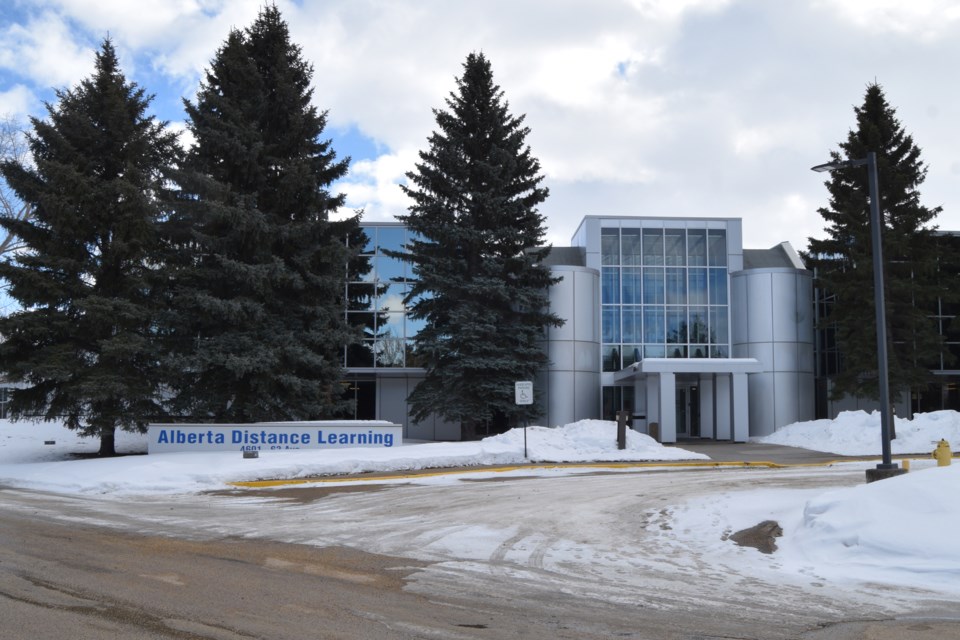BARRHEAD - The province appears determined to transition the Alberta Distance Learning Centre (ADLC) to a new funding model that will cover all distance education providers over the next two years.
However, the Pembina Hills School Division is hoping to convince provincial officials that it provides a unique service and is calling on other school boards to help make that case — Pembina Hills has had a service agreement with the province to operate the ADLC since 1997.
As part of this agreement, ADLC received block funding to provide free distance learning to all schools in the province. Urban, metro and rural schools of all types have utilized these services.
Board chair Jennifer Tuininga clarified in an e-mail that when a high school registers their student in an ADLC course that is taught by an ADLC teacher, the school only gets 44 per cent of the funding associated with that student because the ADLC is funded by Alberta Education based on the number of students served. That equates to 56 per cent of instruction funding.
On Feb. 28, Pembina Hills Supt. David Garbutt posted an update to the ADLC’s website stating they’ve received notice from Alberta Education deputy minister Andre Corbould that the service agreement between the school division and the province will end in two years. Furthermore, Garbutt said they will receive $14 million in funding from the province in 2020-2021 and $7 million in 2021-2022.
For reference, the 2019-2020 budget of the Alberta Distance Learning Centre, which the Pembina Hills board passed in June 2019, totaled $18.535 million in revenue and expenses. Approximately $17.015 million was budgeted to come directly from Alberta Education.
On March 5, Garbutt posted another update to the ADLC’s website, a day after a teleconference had occurred between Alberta Education and Pembina Hills.
According to Garbutt, the message from the ministry about the conclusion of the service agreement “remains the same” and the province intends to shift ADLC to the same funding model for all distance education schools, which receive per credit funding for high school students and per student funding for Grades 1-9 students.
However, Alberta Education Minister Adriana LaGrange, who took part in the teleconfererence, expressed interest in continuing the conversation.
Garbutt said the first step will be a follow-up meeting between himself, Corbould and assistant deputy minister Gene Williams. As well, LaGrange has also committed to visiting the ADLC campus.
Garbutt said that as this conversation continues, they will be highlighting a number of key points. For example, one of the arguments that has been put forward by Alberta Education is that when the service agreement, ADLC was the only distance education provider in the province, and now there are 32 school authorities offering distance education.
However, Garbutt pointed out in the update that ADLC is not a distance education school and never has been. Rather, it is a provincial service that fills “critical gaps in programming” by providing student instruction and teacher resources to 888 public, separate, charter, private and federally-funded schools.
He also noted that the ADLC provides services to divisions with Hutterite Colony and Outreach Schools, as well as schools with specialized language programs, personalized learning and CTS/elective programming.
Garbutt added that to provide a complete understanding of the impact that ADLC has on students, teachers and schools, they will be reaching out to partner schools to gather data and feedback.
“We are seeking details on how their students, teachers and programs are impacted by ADLC,” he said.
Athabasca-Barrhead-Westlock MLA Glenn van Dijken, who also took part in the teleconference, said Alberta Education has recommended “that we move in a direction that recognizes over half of school divisions are now providing distance education.”
However, he said they also recognized that there will need to be some learning over the next two years as to how a new funding model will allow the ADLC to function.
van Dijken said the two-year extension of the service agreement will allow for time to transition to the new model.
He acknowledged Pembina Hills’ point that they are not a distance education provider like other school divisions in the province. He said he believes the education minister also recognizes the difference.
“The minister’s goal in all this, I believe, is to ensure that Albertans have quality distance education available to them, and we’re able to deliver that in an efficient manner,” he said.
Finally, when asked if he would fight to keep jobs in the Barrhead area, van Dijken said he will continue to do so.



